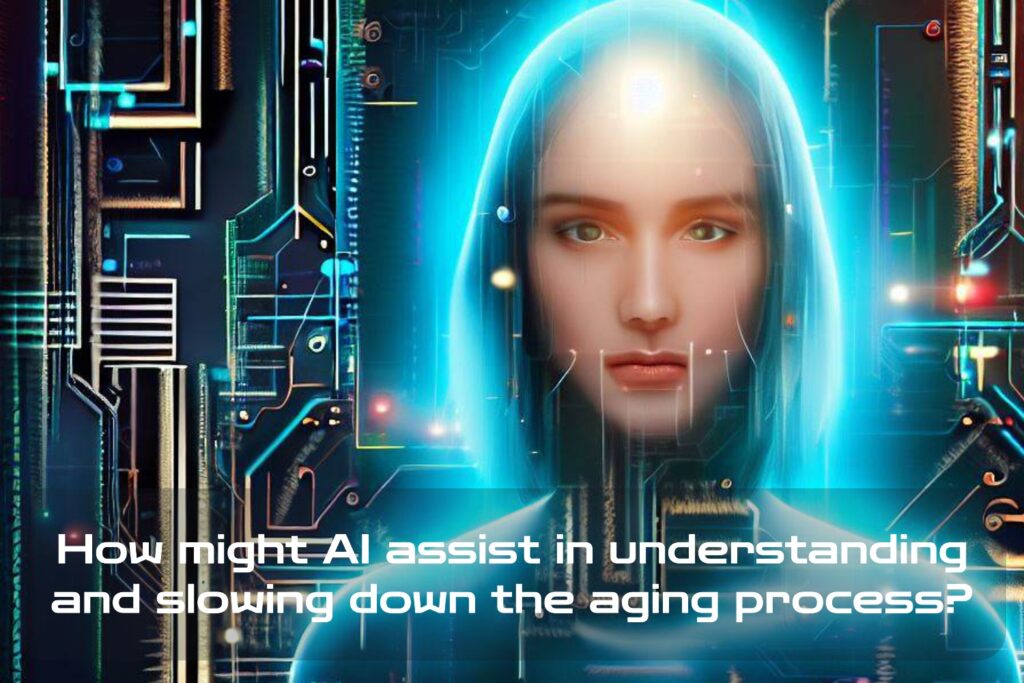Aging is a natural process that affects every living organism, including humans. It refers to the changes that occur in our bodies over time, leading to a decline in physical function and an increased risk of diseases. These changes can be seen at both the molecular and systemic levels, affecting every organ system in the body.
The aging process is complex and multifactorial, influenced by genetic factors, environmental factors, lifestyle choices, and random events. The aging population is increasing worldwide due to advances in healthcare and technology.
As people live longer lives, there is an increasing demand for treatments that can slow down or even reverse the aging process. This has led scientists to explore new approaches to understanding aging and developing interventions that can improve health span – the period of life free from age-related diseases – as well as lifespan.
The Potential of AI in Anti-Aging Research
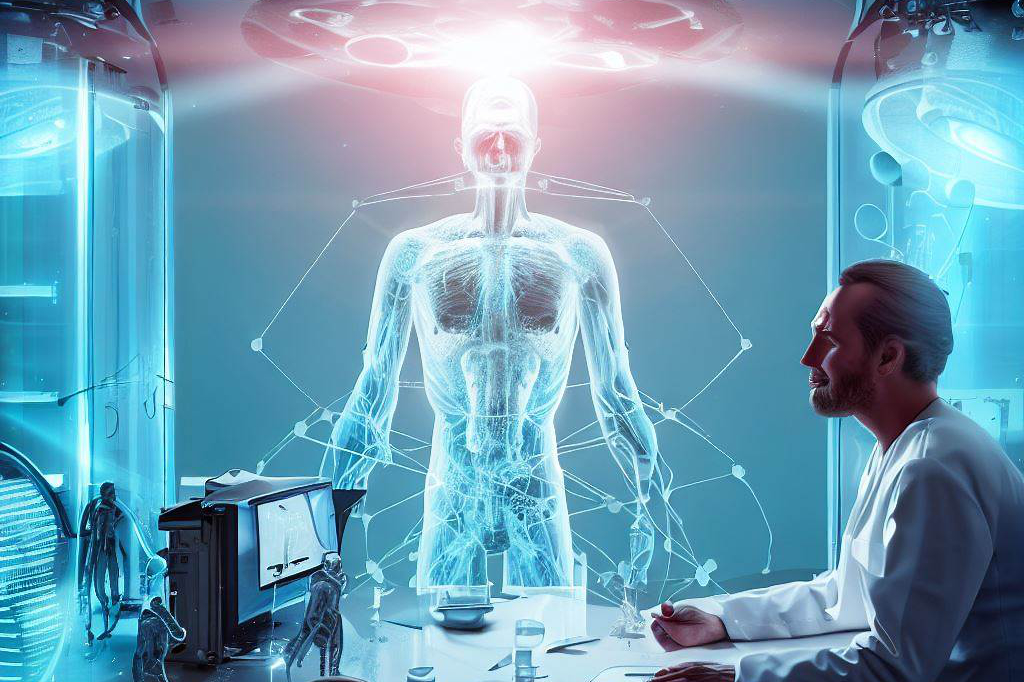
Artificial intelligence (AI) has emerged as a promising tool for anti-aging research. With its ability to analyze large amounts of data quickly and accurately, AI can help researchers identify patterns and relationships between different biological processes involved in aging.
Moreover, AI can assist in developing personalized anti-aging treatments based on individual genetic factors. Using machine learning algorithms trained on large datasets of biological data such as
- genomics,
- epigenomics,
- transcriptomics
- or proteomics
data generated from different experiments conducted on multiple organisms, researchers have been able to predict the chronological age (age since birth) or biological age (the level of functional decline or physiological stress) with high accuracy.
This approach has allowed researchers to gain deeper insights into the mechanisms driving cellular senescence – one of the primary drivers behind biological aging – including epigenetic regulation of gene expression patterns linked with senescence. By analyzing these patterns using AI, researchers can identify new targets for drug development and interventions to slow down the aging process.
Can AI Help in Slowing Down Aging?
While AI is not a magical cure for aging, it has the potential to revolutionize how we approach anti-aging research. By combining data from different sources, including genomics and proteomics studies as well as clinical trials, with AI tools, scientists can develop more targeted interventions that can slow down age-related diseases and improve the quality of life of older adults. AI tools can also be used to monitor health and assist with daily tasks for older adults.
For example, virtual assistants combined with wearable devices that monitor vital signs could provide real-time data on health status. Similarly, social robots could be used to engage in conversation and assist with daily tasks such as medication reminders or meal planning.
While there are ethical considerations around using AI in anti-aging research – including privacy concerns around personal genetic information – the potential benefits outweigh these concerns. With continued scientific research, we may one day be able to use AI-powered interventions to improve the health span of people around the world.
Understanding Aging with AI
How AI can help analyze large amounts of data on aging
As we age, our bodies undergo numerous changes at the cellular level. These changes are incredibly complex and require vast amounts of data to fully comprehend.
Fortunately, AI has shown tremendous potential for analyzing this data and providing insights into the aging process. One way AI can help is by analyzing large datasets containing information on genes, proteins, and other biological markers associated with aging.
By examining these datasets, AI algorithms can identify patterns that would be difficult or impossible for humans to detect manually. This information can then be used to develop new anti-aging treatments or improve existing ones.
Another way AI is helping us understand aging is through the use of machine learning algorithms that can sift through massive amounts of research papers and scientific studies related to aging. By automatically extracting key information from these sources, researchers can get a better understanding of how different factors contribute to the aging process.
Examples of current research using AI to understand aging at the cellular level
One example of current research using AI to understand aging at the cellular level is a study conducted by scientists at Stanford University School of Medicine. The researchers used a deep learning algorithm to analyze thousands of images depicting human cells at different stages in their life cycle. By examining these images, the algorithm was able to identify patterns in how cells age over time.
Another example comes from a team at MIT who developed an algorithm that predicts skin health based on gene expression data from skin samples. The algorithm was trained on a dataset containing over 47 million gene expression measurements taken from over 16 thousand skin samples collected from over 2000 people worldwide.
The results showed that certain genetic factors are strongly correlated with healthy skin and could potentially be targeted for anti-aging treatments in the future. Overall, these studies demonstrate how AI is helping us gain a deeper understanding of the aging process and develop new treatments that could extend healthy lifespan.
Personalized Anti-Aging Treatments
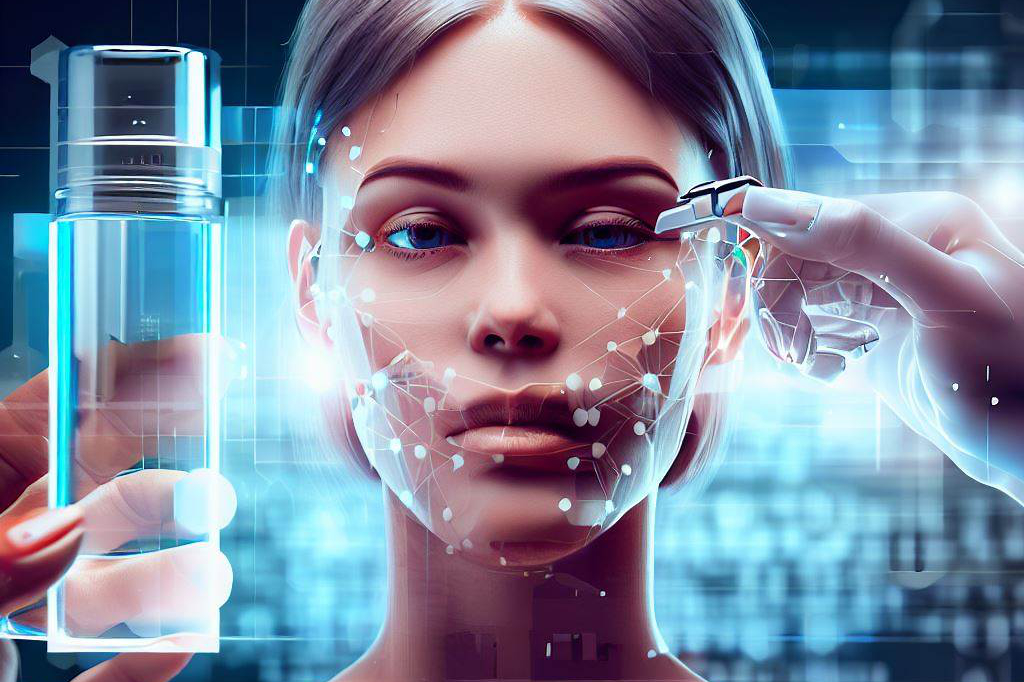
The Role of AI in Personalized Anti-Aging Treatments
With the help of AI, researchers can now analyze vast amounts of data on individuals’ genetic makeup, lifestyle factors, and environmental exposure to identify the root causes of aging. By understanding the underlying mechanisms that cause aging at a molecular level, scientists can develop personalized anti-aging treatments tailored to an individual’s unique needs. AI algorithms can also predict how an individual’s body will respond to different treatments and lifestyle changes.
This information helps physicians create customized healthcare plans for each person. Using this approach, doctors can treat specific signs of aging with a more targeted and effective approach than traditional medicine.
Examples of Companies Already Using AI for Personalized Skincare and Health Recommendations
Several companies have already started using AI for personalized skincare and health recommendations.
One such example is Skinsei, which provides personalized skincare routines based on an individual’s skin type, diet, environment, and lifestyle factors like stress levels and sleep patterns.
Another company is Clip Health which uses smartphones as diagnostic tools, leveraging different technologies, including artificial intelligence, to detect early-stage health conditions by analyzing data from biomarkers in bodily fluids like saliva.
These companies demonstrate the potential value that AI could bring to personalized anti-aging treatments in the future. By focusing on individual needs instead of a “one-size-fits-all” approach, these companies are ushering in a new era of healthcare where patients receive tailored care based on their unique genetic makeup and lifestyle factors rather than generic guidelines.
The use of AI for personalized anti-aging treatments represents a significant step forward in human longevity research. Through precision medicine approaches using machine learning algorithms based on extensive data analyses it will be possible to understand how biological processes change over time at the molecular level, leading to efficient diagnosis or treatment.
While there is still much research to be done in this field, the progress made so far shows that personalized anti-aging treatments could be a reality in the near future. With AI’s help, individuals could enjoy longer and healthier lives with treatments tailored to their own health requirements.
Early Detection of Age-related Diseases

As we age, our bodies become more susceptible to various diseases, including Alzheimer’s and Parkinson’s. However, early detection of these diseases can greatly improve treatment options and the quality of life.
This is where AI comes in. By analyzing large amounts of data on biomarkers and other factors, AI can assist in the early detection of age-related diseases.
How AI Can Assist in Early Detection
Researchers are currently exploring how AI can analyze various types of data to detect early warning signs of age-related diseases. For example, in Alzheimer’s research, scientists are using AI to analyze brain scans for specific biomarkers associated with the disease. By identifying these biomarkers at an early stage, doctors may be able to intervene with treatments that slow or even halt the progression of the disease.
In Parkinson’s research, scientists are using machine learning algorithms to analyze patient data and predict which patients are at a higher risk for developing the disease. This could lead to earlier diagnosis and treatment options for those at risk.
Examples of Current Research
A recent study published in the journal Nature Medicine used machine learning algorithms to predict which individuals were most likely to develop Alzheimer’s disease based on brain imaging data. The algorithm was able to identify individuals who would go on to develop Alzheimer’s years before symptoms appeared with an accuracy rate of 84 percent.
In another study published in the Journal of Parkinson’s Disease, researchers used AI algorithms to predict which patients with mild cognitive impairment would go on to develop Parkinson’s disease within three years. The algorithm was able to correctly identify 85 percent of those who would later develop Parkinson’s.
AI has tremendous potential when it comes to detecting age-related diseases like Alzheimer’s and Parkinson’s at their earliest stages thanks to its ability to analyze large datasets and identify subtle patterns and biomarkers that might be missed by human observers. With the help of AI, doctors may one day be able to diagnose these diseases before symptoms even appear, leading to more effective treatments and better outcomes for patients.
Improving Quality of Life for Older Adults
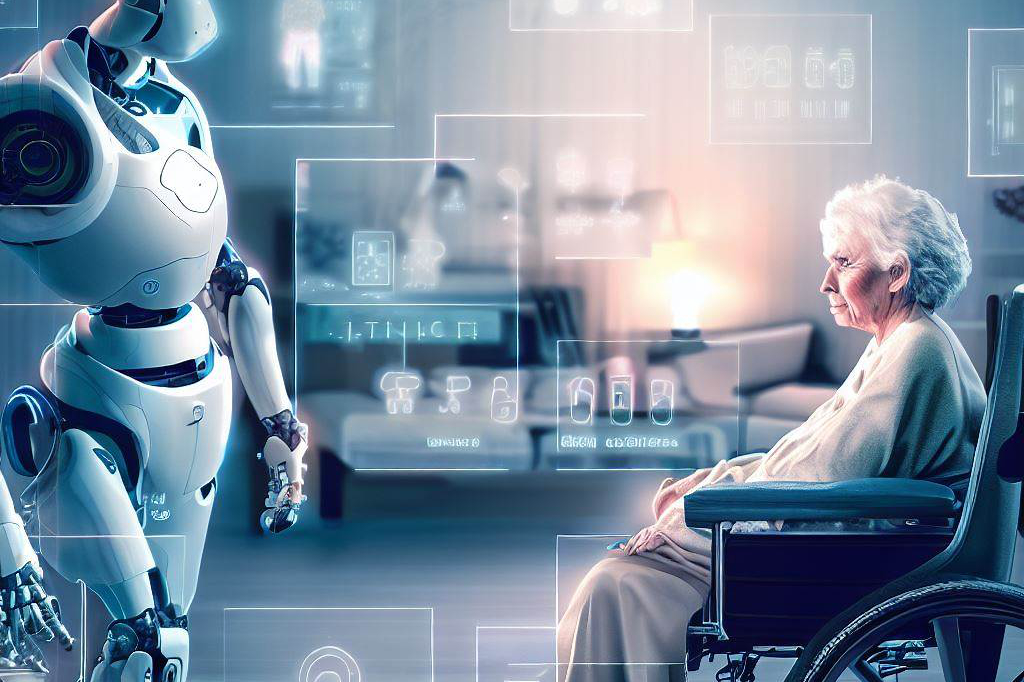
AI Monitoring Health:
One way that AI can assist in improving the quality of life for older adults is by monitoring their health. Wearable technology and smart home devices equipped with sensors can collect data on vital signs such as heart rate, blood pressure, and oxygen levels. This data can be analyzed in real-time by AI algorithms to detect any abnormal changes and alert caregivers or medical professionals if necessary.
This early detection could potentially prevent serious health conditions from developing or progressing. For example, a company called CarePredict has developed an AI-powered wristband that tracks the daily routines of seniors living independently.
The device monitors activities such as eating, sleeping, and grooming to detect any changes in behavior that could indicate declining health. Caregivers or family members receive alerts if there are any deviations from normal patterns.
Social Support:
Another way AI can improve the quality of life for older adults is by providing social support. Loneliness and social isolation are major issues facing many seniors, especially those who live alone or have limited mobility.
Companion robots powered by AI technology offer potential solutions to this problem. These robots can provide companionship, engage in conversations, play games with users, and even monitor medication schedules.
One example is ElliQ from Intuition Robotics which uses natural language processing (NLP) to communicate with users through voice interactions and facial expressions. The robot offers reminders for appointments or medication schedules as well as suggesting activities based on the user’s interests.
Assisting with Daily Tasks:
AI can assist in improving quality of life for older adults by assisting with daily tasks. Smart home devices equipped with virtual assistants like Amazon’s Alexa or Google Assistant can help seniors perform tasks such as making phone calls, setting reminders, playing music/audiobooks/TV shows/movies etc. Additionally, AI-powered robots can help with household chores such as cleaning and cooking.
One such example is the Roomba robot vacuum from iRobot which uses AI technology to map out a home’s floor plan and navigate around obstacles while cleaning efficiently. Another example is Moley Robotics (website needs to be seen to be believed!) which has developed an AI-powered robotic kitchen with two robotic arms that can cook meals using pre-programmed recipes or new ones learned from chefs.
Overall, AI has the potential to improve the quality of life for older adults in many ways, including by monitoring health, providing social support, and assisting with daily tasks. While there are still ethical considerations to address, the benefits of utilizing AI in this way cannot be ignored.
Ethical Considerations
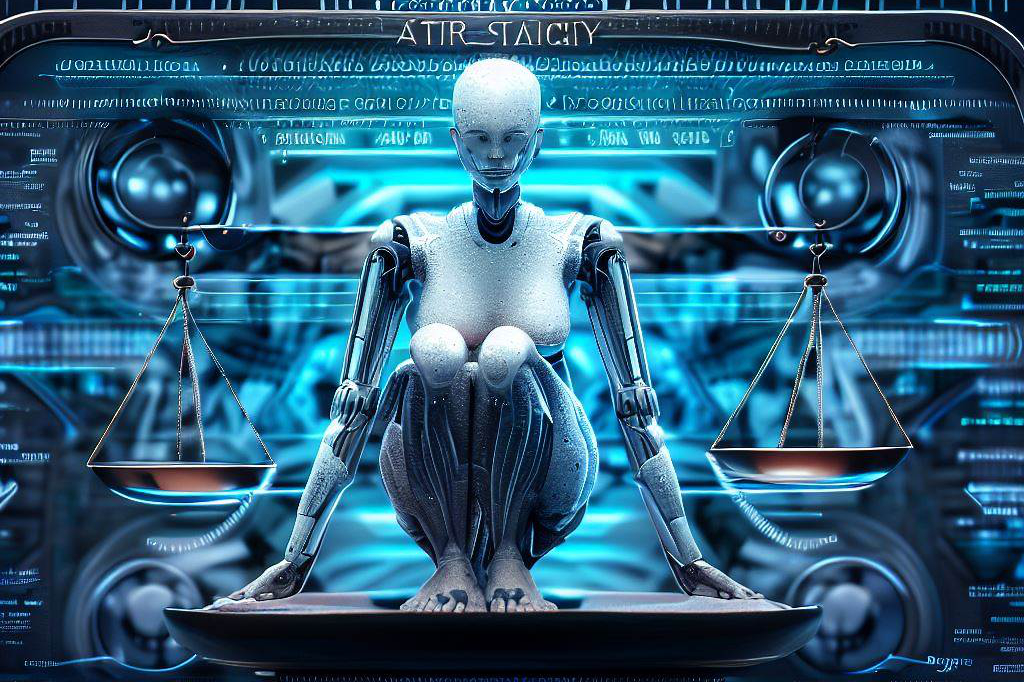
Potential biases in data analysis
As with any form of technology or research, there is always the potential for bias in data analysis. When it comes to anti-aging research and the use of AI, there is a risk that certain demographics may be underrepresented or overlooked.
For example, if the AI algorithms are trained on data from primarily wealthy, white, and male populations, then any anti-aging treatments created based on that data may not be effective for other groups. Therefore, researchers need to ensure that they’re using diverse and representative datasets to train their AI algorithms.
Privacy concerns with personal genetic information
Another important ethical consideration when it comes to using AI in anti-aging research is privacy concerns surrounding personal genetic information. While personalized treatments based on an individual’s genetic makeup show promise for slowing down aging, there must be strict protocols for protecting this sensitive information.
There is a risk that this information could be used against individuals by insurance companies or potential employers. Therefore, legal protections must be put in place to prevent such misuse.
Ensuring transparency and accountability
As with any scientific research involving human subjects, transparency and accountability are essential when it comes to using AI in anti-aging research. Researchers need to ensure that they have informed consent from participants involved in their studies and that they’re transparent about how their data is being used.
Additionally, there should be oversight committees responsible for reviewing the ethical implications of the study design and ensuring that no harm is done to participants or society at large. Overall, while the use of AI shows great promise in advancing our understanding of aging and creating new anti-aging treatments personalized for individuals’ unique needs; we must also carefully consider these ethical considerations before moving forward with widespread adoption of such technology into clinical practice.
Final Thoughts
The potential for AI to assist in understanding and slowing down the aging process is vast. With the ability to analyze large amounts of data, create personalized treatments, and detect age-related diseases early, AI could revolutionize how we approach aging. However, as with any technological advancement, there are ethical considerations that must be taken into account.
One of the most significant concerns is biased data analysis. It’s crucial to ensure that the data used to develop anti-aging treatments is diverse and representative of all populations.
Additionally, privacy concerns must be addressed when it comes to personal genetic information. Despite these concerns, the potential benefits of using AI in anti-aging research are immense.
By extending healthy lifespans and improving the quality of life for older adults, we could unlock a world where people can continue to contribute their expertise and experience well into their golden years. As we continue down this path of exploration and development in anti-aging technology, it’s important not to lose sight of our humanity.
The goal should not simply be extending life but also ensuring that those extra years are full of joy and purpose. With careful consideration and collaboration between researchers, ethicists, policymakers, and society at large—we could turn this dream into a reality sooner than we think.
FAQs: How might AI assist in understanding and slowing down the aging process?
1. What is the role of AI in understanding the aging process?
– AI, or artificial intelligence, plays a crucial role in understanding the aging process by analyzing vast amounts of data and identifying patterns, correlations, and insights that may not be apparent to human researchers alone. It helps uncover underlying factors contributing to aging, such as genetic predispositions, lifestyle choices, and environmental influences.
2. How does AI help in slowing down the aging process?
– AI assists in slowing down the aging process through various avenues. For instance, it can facilitate the discovery of potential anti-aging therapies or interventions by identifying promising compounds, analyzing their effects on aging-related biomarkers, and predicting their efficacy. AI can also aid in personalized medicine, allowing healthcare professionals to tailor treatments based on an individual’s unique genetic makeup and specific aging-related factors.
3. Can AI predict an individual’s biological age accurately?
– AI has made significant advancements in predicting an individual’s biological age. By analyzing various biological markers, such as DNA methylation patterns, telomere length, and gene expression profiles, AI algorithms can provide reasonably accurate estimates of an individual’s biological age. Although it may not be 100% precise, AI’s predictive capabilities continue to improve with advancements in data collection and algorithm development.
4. How can AI contribute to the development of personalized anti-aging treatments?
– AI’s contribution to personalized anti-aging treatments is invaluable. By analyzing an individual’s genetic information, lifestyle factors, and health records, AI algorithms can identify specific risk factors and biomarkers associated with aging. This information enables the development of personalized treatment plans tailored to address an individual’s unique aging-related challenges. AI can also predict an individual’s response to different interventions, helping optimize treatment strategies for maximum effectiveness.
5. What ethical considerations are associated with the use of AI in the aging field?
– The use of AI in the aging field raises important ethical considerations. One significant concern is privacy and data security. As AI relies on vast amounts of personal data to generate insights and predictions, it is crucial to ensure that this information is protected and used ethically. Additionally, the potential for bias in AI algorithms must be addressed to ensure fair and equitable treatment for all individuals. Transparency in AI decision-making processes and clear guidelines for the responsible use of AI technologies are essential to mitigate ethical concerns.
6. How can AI assist in early detection and prevention of age-related diseases?
– AI can play a vital role in the early detection and prevention of age-related diseases. By analyzing large datasets containing medical records, genetic information, and lifestyle data, AI algorithms can identify patterns and risk factors associated with various age-related conditions. This enables early detection of diseases, allowing for timely interventions and treatments. AI can also provide personalized recommendations for preventive measures based on an individual’s specific risk factors, promoting proactive health management.
7. What challenges exist in implementing AI in the study of aging and anti-aging interventions?
– Several challenges need to be addressed when implementing AI in the study of aging and anti-aging interventions. Firstly, the availability and quality of data are crucial. Access to diverse and comprehensive datasets, including longitudinal studies and multi-omics data, is essential for accurate AI analysis. Secondly, the interpretability and explainability of AI algorithms are important to ensure that researchers and healthcare professionals can understand and trust the results. Finally, the integration of AI into existing healthcare systems and regulatory frameworks requires careful consideration to ensure seamless adoption and compliance with ethical and legal standards.
8. Can AI contribute to lifestyle recommendations for healthy aging?
– Yes, AI can contribute significantly to lifestyle recommendations for healthy aging. By analyzing data from various sources, including wearable devices, fitness trackers, and health apps, AI algorithms can assess an individual’s lifestyle patterns, such as sleep quality, physical activity levels, and dietary habits. Based on this analysis, AI can provide personalized recommendations for improving lifestyle factors that contribute to healthy aging, empowering individuals to make informed decisions about their well-being.
9. Is AI capable of extending human lifespan?
– While AI has the potential to contribute to extending human lifespan through advancements in healthcare and anti-aging interventions, it is essential to note that it is not a standalone solution. AI serves as a powerful tool to support research, drug discovery, and personalized medicine, but ultimately, the goal of extending human lifespan requires a multifaceted approach involving various scientific disciplines, public health measures, and societal factors.
10. How can AI be used to promote healthy aging in the elderly population?
– AI can be used to promote healthy aging in the elderly population in several ways. For example, AI-powered monitoring systems can track an individual’s vital signs and detect anomalies, alerting healthcare providers or caregivers in case of emergencies. AI algorithms can also analyze speech patterns or behavioral changes to identify signs of cognitive decline or mental health issues, enabling early interventions. Additionally, AI-based virtual assistants can provide personalized reminders for medication adherence, exercise routines, and other healthy habits, supporting independent living and well-being.

C M, a seasoned editor, journalist, and consultant, is deeply fascinated by the convergence of technology, space, and the future of humanity.
With a particular interest in transhumanism, futurology, and the philosophical and ethical dimensions of these domains, C M serves as the lead contributor to TranscendSphere and SpaceSpotlight.
When not penning insightful articles on these rapidly evolving fields, C M indulges in their love for podcasts and books, proudly embracing their status as a ‘Happy Nerd Extraordinaire!’

